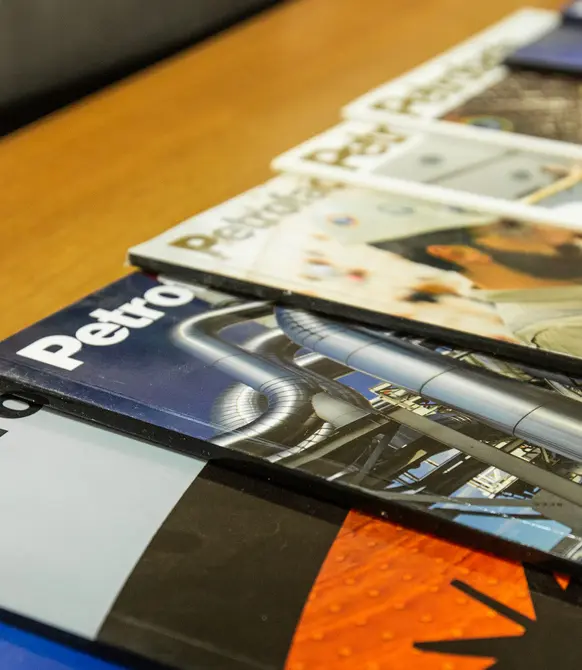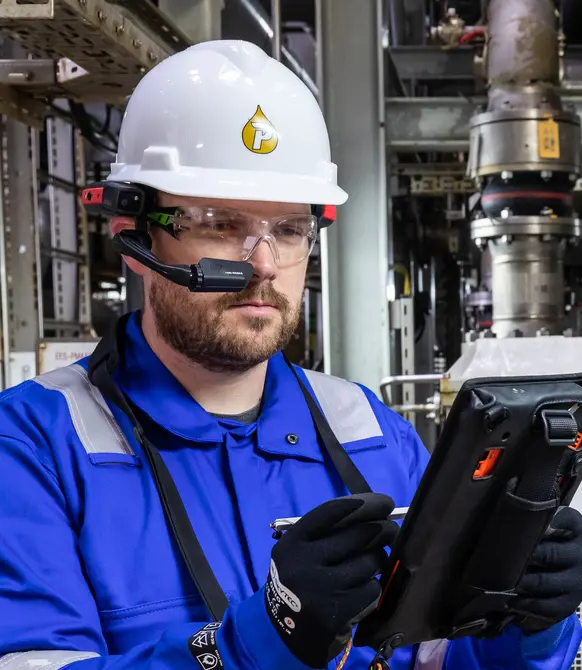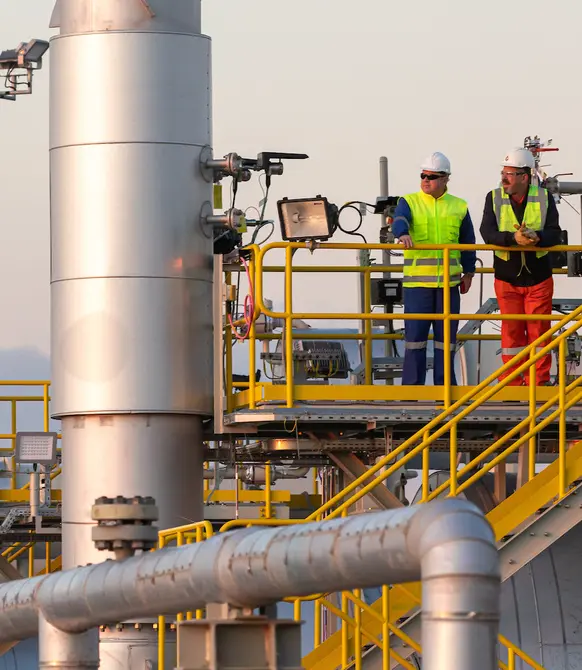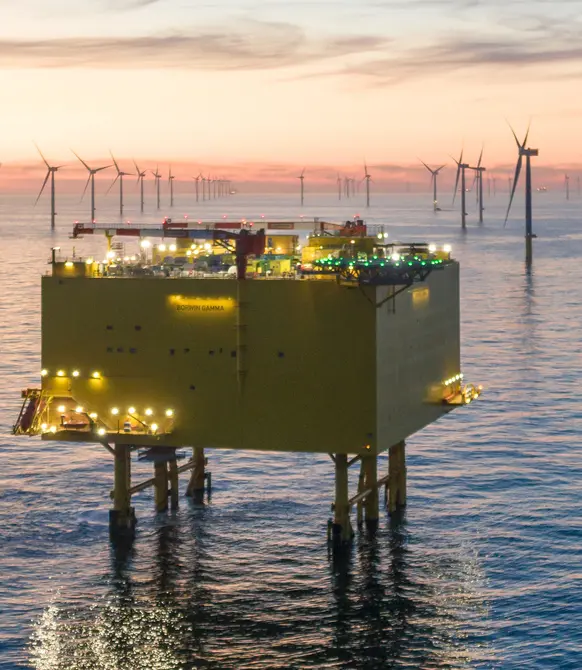Energy Talks
Why data foundations matter: our CIOs take on the future of digital and AI in energy
We welcome Samantha Dickinson, Petrofac's Chief Information Officer, to Energy Talks.
In this episode, we discuss how data and AI are shaping transformation across the energy sector. She shares why getting the data foundations right is critical, how to turn the promise of AI into practical solutions, and why leading with purpose builds smarter, future-ready teams.
Episode highlights
Why energy, why now: Samantha shares what drew her from aviation and consulting into energy, and why Petrofac felt like the right fit.
Resilience from day one: Joining the week of the global IT outage, Samantha reflects on teamwork and what she learned about Petrofac under pressure.
Building smarter with data: Why strong data foundations are essential for digital transformation, AI adoption, and smarter decision-making across the sector.
AI with purpose: Samantha shares how we're approaching AI - where there's data maturity, a clear problem statement, and real business value.
People and purpose: From psychological safety to cross-disciplinary collaboration, Samantha explains why culture and curiosity are key to future-ready teams.
Energy Talks
Samantha Dickinson
Why data foundations matter
Transcript
Darren Hill (00:00):
Welcome back to Energy Talks. In this episode, I've been joined by Samantha, Petrofac's Chief Information Officer, and we're going to explore the role in data in driving transformation across the sector. Samantha shares what brought her to Petrofac, why getting the Data Foundations right matters now more than ever, and also how we can turn the promise of AI into something truly practical. It's a conversation about building smarter systems, creating future ready teams, and the power of weeding with purpose. So grab a coffee and enjoy this episode. Samantha, thank you so much for joining me on Energy Talks today.
Samantha Dickinson (00:32):
You're welcome. Thanks for having me.
Darren Hill (00:33):
You've worked across aviation, manufacturing and consulting. What made you take the jump into energy sector and why? Specifically with Petrofac
Samantha Dickinson (00:41):
Across my life, I've always enjoyed a good challenge.
As I said to my team when I first got here, I don't do boring, and I was really at that point where I was looking for something different and I saw that there was the opportunity of Petrofac. I'd always been fascinated with the energy industry. It's in every aspect of our life, and I thought, wouldn't it be amazing to work in that space? So I started doing some research and I thought actually from a technology perspective, the opportunities that lie ahead of us are huge. That was the main driver around joining, trying to move into this industry. And then with Petrofac, I know it's had some challenging times in the last few years, but the growth trajectory that lies ahead of us is fantastic, and I thought, how amazing would it be to be a part of that journey and to be a part of that adventure
Darren Hill (01:29):
You didn't have a normal start to life of Petrofac. Most other people come in, get to know the place, meet people. You came in day one of CrowdStrike, the global IT outage.
Samantha Dickinson (01:38):
It was an eyeopener, an induction of fire, I would say. So I think I'd been here a few days and then I was working from home on the Friday when CrowdStrike happened and I remember opening my laptop and I couldn't log in and I thought, oh my goodness, I've been here one week and I've broken my laptop already. This is horrendous. So I rang the tech hub and I was having a chat to them and then we started to see the tickets coming and we started to realize actually this is much bigger. For me, what stood out was on the IT side, the collaboration, the commitment and the knowledge of our landscape and the resilience of our landscape that allowed us to recover very quickly, but also on the business side and a number of stakeholders and our executive, the calmness and willingness to listen and understand about what was going on so we could ensure the business could continue to operate as best as possible. So it's not what I would ask or wish any new CIO to have, but it was an amazing way to see how the way a company truly operates at a time that is incredibly challenging.
Darren Hill (02:43):
Yeah, exactly. You probably got to know the business better than you would have six months without a CrowdStrike. You mentioned that Petrofac felt like an opportunity to build something truly special. What was about the role and the timing that made that feel? So right,
Samantha Dickinson (02:56):
There wasn't any one particular thing. I think it was just the stars aligned and the service orientation of the business. So being very customer centric, that's at the heart of what I think should be of any organization, but also particularly of an IT department and the services it provides. So an alignment from a values and integrity perspective was really important to me and it just made sense.
Darren Hill (03:20):
And you said before there was one of my favorite things, you said it today and you said in an article previously that I read, I don't do boring. So what kind of leadership environment are you building here and how are you going to bring that same mindset to the team?
Samantha Dickinson (03:33):
I think a big piece for me is creating a psychologically safe environment where people can bring their true selves to work. So I don't do boring, but I also believe that I like to have fun at work and I take work
Samantha Dickinson (03:47):
Seriously
Samantha Dickinson (03:49):
And I want to create an environment where the teams feel like that as well. They can come to the work, they can be themselves, they can speak up, they can be open, honest, but they work hard, but they enjoy themselves while they do it. I think we live in a VUCA world, it's volatile on certain complex and ambiguous and that's the reality of life. And I think it will continue to be like that now and probably forever. So we have to be constantly ready for change, for uncertainty, and to create a safe environment where people embrace that, but feel comfortable in it at the same time is important. And I think that to me is what's will make a difference and will help Petrofac back into the future.
Darren Hill (04:31):
Yeah, a hundred percent. I think especially for your line of work where you need everyone working together and even the tiniest problem could spark something bigger. So you need everyone on the same team all coming together and sharing unfiltered almost.
Samantha Dickinson (04:44):
Yeah, absolutely. And collaboration is key. I think. I've never been one that believes in individuals solving problems by themselves. I love to solve problems. That's why I'm in technology. I'm not a techie by heart, but for me, the exciting thing is how technology can solve problems, but problems can only be solved when you bring all the great minds together. So bringing different personalities, bringing different mindsets, bringing different types of intelligence together to solve problems is what makes things really exciting and interesting.
Darren Hill (05:14):
It would be amiss if we didn't talk about AI, but I don't want to talk about that yet. I think enough people are talking about it, but we will talk about it. I want start with the basics, and you've talked about the opportunity here. So what for you is step one in what you're trying to build here?
Samantha Dickinson (05:29):
A key part for me for any successful IT capabilities is the importance of partnership with the business stakeholders and with our clients and building those relationships. So foundational is making sure truly understand what our problems are, where our opportunities lie, and as a business, what we're trying to achieve and working together to solve that. Underpinning all of that though for me of the years have gone by, I've realized that the data is the basis of everything. So you can't achieve digital transformations, adoption of AI and really any future-proofed modern technology if your data is not solid. So that is a big focus for us is driving that data maturity, focusing on our data quality and also focusing on the connectedness of our ecosystem so that continuous flow of data can be leveraged and taken advantage of. So that is a big part for us, but we have to do it in partnership with our business stakeholders and ultimately also for our clients.
Darren Hill (06:34):You've talked about having a strong data foundation there. Why is it so critical, especially in the energy sector?
Samantha Dickinson (06:40):
I think a key part of data is that it is so foundational to learning. So even from a people perspective, before technology existed if you didn't have information, if you didn't have data, you wouldn't learn and therefore you wouldn't improve and you couldn't deliver value. And the same goes for technology. So we have a huge abundance of data. I mean, Petrofac's been here for years and we've got decades worth of information. It's taking that and using it so we can learn from it, and that's what AI does. It learns from data, it creates patterns and logic from data. And so that's why I think in the energy sector in particular, it has got a huge amount of data available that we can leverage to drive those insights and to learn from
Darren Hill (07:27):
Is there cross learnings that can be made that you can use the data for?
Samantha Dickinson (07:30):
Absolutely, and I think that's an area that we're trying to focus on and drive to see where we can pull those insights and working really closely with the engineering teams to do that and also the project controls teams that we've got.
Darren Hill (07:42):
Definitely, and like you said, it's like all about that collaboration, so understanding what their needs are and then you can build the systems around that.
Samantha Dickinson (07:48):
Exactly, exactly.
Darren Hill (07:49):
We were talking off camera before, just before we started about the misconception. It is just that, oh, my laptop's broken, can you help me? But it's got such a wide raging impact.
Samantha Dickinson (07:58):
Yep, absolutely. And it's in many ways you're in the shadows, but we are there to support and enable. But a big part of what I can see across the industry as well is the role that it can play with that predictive maintenance. And so that drives operational efficiencies, it drives cost reductions, and I think there's also opportunities into the future around actually helping drive revenue, but it potentially also introducing new revenue streams within the industry. Even though it's in the background, it's there, it's a bit like a house. You need to have the foundations. You can't just have the house without it. Maybe in some ways your data and everything that underpins it is the foundations to the success of a construction of a house or an origami.
Darren Hill (08:43):
AI is everywhere in the conversation right now. But from your perspective, what's the real opportunity of AI in the energy sector?
Samantha Dickinson (08:50):
I think the opportunity lies in increased collaboration across the industry of services companies like Petrofac, working alongside our operators to see how we can really embed AI and leverage AI in all phases of our delivery of the services that we provide and all phases of oil and gas industry. I also think there's a big piece around the role that AI plays with the convergence of IT, OT and ET for the, not saying you're not a techie, but for the non-techies kind of looking at the role that in itself around it being your information technology, your old school IT services, OT, your operational technology, your sensors that are collecting the data on the facilities and then your ET, your engineering technology and how we leverage that to drive and putting those together and the convergence that we're seeing there, I think is a huge opportunity, but it's also does present risks from a cybersecurity perspective that we have to continue to closely monitor. There is a role that AI will play in all of that without a doubt, and it's just starting to work and collaborate with our operators, our suppliers, the large tech companies that are out there to see how we can really bring that together.
Darren Hill (10:08):
Excellent. And it's about doing it when it's right for not only the business, but right for the industry and right for the project that we're working on.
Samantha Dickinson (10:15):
Absolutely, absolutely.
Darren Hill (10:17):
My personal biggest bugbear with AI is that I often find it's a solution without a clear problem. What's Petrofac doing now that sets us up to use AI in a way that's safe, strategic, but actually genuinely useful.
Samantha Dickinson (10:30):
From our perspective, I've made it very clear one of our strategic priorities is AI, where it makes sense and where it makes sense in its simplest form is that we have a clear problem statement. So we won't just do random proof of concepts for the fun of it. They're great if you want to create some
Samantha Dickinson (10:45):
Innovation,
Samantha Dickinson (10:46):
But even then you need to have a clear problem statement and also where we have the data maturity. So if we haven't got the data maturity, then we're not going to do it. If we haven't got a clear problem statement that we're trying to solve, we're not going to do it. And I think it takes discipline. You can get carried away.
Darren Hill (11:05):
Oh, definitely.
Samantha Dickinson (11:06):
And I think it's just having that discipline is what's important to us.
Darren Hill (11:09):
I always find that it enables you to do more but not necessarily do what's right
Samantha Dickinson (11:16):
Or more of something that you suddenly realized you spent half an hour messing around with chatGPT, and you've got actually, I'm not doing what I meant to be doing.
Darren Hill (11:23):
Exactly. I know it's just another distraction in our modern world as much as that at times. But no, I think that's the best way and I think it is where it has impact, not just we're doing it for the sake of doing it.
Samantha Dickinson (11:34):
It also gives people focus and alignment, right? Because even if you're looking at leveraging ai, you need to bring teams together to take advantage of it. And if they don't have a common purpose, if they don't have a common goal they're working towards, it ends up being disjointed and you don't get the outcomes that you're hope for.
Darren Hill (11:52):
So you touched on it just a bit there. So Petrofac are collaborating with different tech companies and where it makes sense for us as a business, how are we using that and weavering those relationships to basically enhance our IT offering and enhance our data offering?
Samantha Dickinson (12:09):
A lot of it's around relationship management and creating those partnerships. I've said it earlier on that I get my energy from people, my team know that how important it is interacting with different people as well. And so it's building those relationships and they're building those partnerships with some of our strategic technology partners. They've got huge buckets of R and D, that's their expertise, and so it's working alongside them to look at the value they can deliver to Petrofac.
Darren Hill (12:39):
Yeah, it's almost, it's an extended version of how you work across the teams internally as well. And it's almost just applying that where you're gathering knowledge, how do we help you overcome your challenges and make the most of the opportunities, and then taking that upper level as well so you can help inform how they build their products too.
Samantha Dickinson (12:56):
Absolutely, absolutely.
Darren Hill (12:58):
What excites you about the future of data and digital in the energy sector?
Samantha Dickinson (13:02):
I think across the industries, there's quite a few opportunities. There are parts of this industry where it is due to legacy ways of working. The information's quite siloed, so bringing them together is what, and driving that connectedness, but also simplifying it
Samantha Dickinson (13:20):
And
Samantha Dickinson (13:20):
bringing insights and learnings from different industries to actually help with that.
Darren Hill (13:24):
It's almost like the perfect storm, positive storm of innovation in the tech landscape, but also now you've got an industry that's ready to start making the most of those opportunities at the same time. So be really interesting what you can build.
Samantha Dickinson (13:39):
And it is more complex. It's not straightforward. So that,
Darren Hill (13:43):
Yeah, hundred percent
Samantha Dickinson (13:44):
There is and there's risk as well. So from our perspective, managing that risk and the health and safety is absolutely paramount. So you've got to do things in a measured manner. I think now technology's a point where we can take some of those risks in the right way and in a controlled manner to look at how technology can play a bigger role. You need to build trust and you do that through starting small and scaling up slowly. If you try and go with a big bang, you'll end up spending a ton of money and you wouldn't have brought people along the journey
Samantha Dickinson (14:15):
To get there in the end. So I think absolutely starting to look at where there are opportunities to test out might be on a smaller project and just test out the different processes, test out different technology, and then if it's successful there, then take it to the next level and slowly build up from there.
Darren Hill (14:32):
And particularly such a complex industry as well and such a one where we have safety is everything. Absolutely. So yeah, it's got to be that sort of step-by-step journey. But yeah, it'll be interesting to see how you build up from here and then take the team on that journey together.
Samantha Dickinson (14:47):
It'll be exciting and it'll be fun. We'll have fun while we do it.
Darren Hill (14:49):
Exactly. We don't do boring here.
Samantha Dickinson (14:51):
No, no.
Darren Hill (14:53):
So you've had a pretty varied career. What advice would you give to digital or IT professionals considering a move into the energy industry?
Samantha Dickinson (15:00):
I think if you enjoy a challenge and you enjoy learning, every day I'm learning something new. I get to a point where I think, yeah, okay,
Samantha Dickinson (15:09):
Got it. Now
Samantha Dickinson (15:11):
I'm on it. And then I sit down and I talk to somebody else, I speak to some engineer and they take me through how they operate. I go, wow, this is fascinating. So it is a fascinating industry and bringing together the different teams, the different, when I say different teams, think about in the context of engineering with your construction teams, with your procurement and supply chain, there is just so many opportunities. It's almost like this from a tech perspective, an IT perspective. It's like the ultimate candy shop because there are really, every day is interesting, and every day you learn something new and that's what makes it exciting.
Darren Hill (15:50):
So yeah, embrace the chance to learn and grow every day.
Samantha Dickinson (15:55):
Yeah, exactly. Someone once said to me, you need to be curious. If you're curious in life, you'll constantly learn. And I think within the oil and gas industry, you have to constantly be curious and you will constantly learn and you'll be challenged and you'll enjoy it and you'll see real value from the work that you do.
Darren Hill (16:11):
Yeah, amazing. I love that. I'm a big curiosity fan as well. So you said before about the people was one of the things that struck you most when you came here about, and is that the thing that's going to keep you excited, curious, and innovating all the way as we go along with this journey?
Samantha Dickinson (16:28):
Yeah, absolutely. If you can't work, different people are motivated by different things, but for me, the people make the big difference and that's what makes it at Petrofac.
Darren Hill (16:39):
Thank you so much for spending some time with you today's month. That's fascinating. To learn about the impact beyond the laptop that the IT had you have across the business.
Samantha Dickinson (16:48):
Yeah. We are a lot more than just the laptops and the mobile
Darren Hill (16:51):
Phones. Exactly. We could debunk that today. Brilliant. Thank you so much. Thanks for having me. Brilliant. Thank you. Thank you for listening to our conversation and subscribe to make sure you don't miss the next episode.







